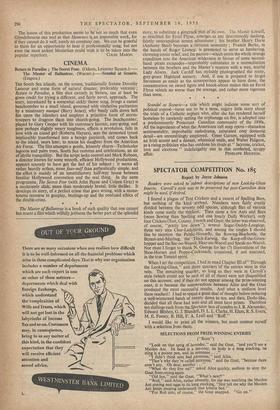CINEMA
Return to Paradise ; The Secret Four. (Odeon, Leicester Square.) The Master of Ballantrae. (Warner.)—Scandal at Scourie. (Empire.) THE South Sea islands, on the screen, traditionally feature Dorothy Lamour and some form of natural disaster, preferably volcanic ; Return to Paradise, a film shot entirely in Samoa, can at least be given credit for trying a different, and fairly novel, approach. The story, introduced by a somewhat sickly theme song, brings a casual beachcomber to a small island, governed with vindictive puritanism by a missionary manqué (Barry Jones), who busily calls down hell fire upon the islanders and employs a primitive force of storm- troopers to dragoon them into church-going. The beachcomber, played by Gary Cooper with his customary laconic, easy-going, and now perhaps slightly weary toughness, effects a revolution, falls in love with an island girl (Roberta Haynes), sees the demented tyrant implausibly transformed into a benign patriarch, and comes back to the island, years later, to rescue his daughter from the American Air Force. The film attempts a gentle, leisurely charm—Technicolor lagoons and palm trees, South Sea customs and celebrations, an air of idyllic tranquillity. But the script lacks control and Mark Robson, a director known for some smooth, efficient Hollywood productions, appears scarcely to have got the feel of his subject ; it seems all rather heavily artless, more faux-nalf than authentically simple, and the effect is mainly of an unsatisfactory half-way house between familiar Hollywood convention and the real thing. In the same programme, The Secret Four (with John Payne and Coleen Gray) is a moderately slick, more than moderately brutal, little thriller. It develops its story, of a perfect crime that goes wrong, with a mono- tonous recourse to gunplay, beatings-up and the confused ethics of the double-cross.
The Master of Ballantrae is a book of such quality that one cannot but resent a film which wilfully jettisons the better part of the splendid story, to substitute a gimcrack plot of its own. The Master himself, as rewritten for Errol Flynn, emerges as any determinedly dashing, faintly unscrupulous screen adventurer ; his brother Henry Durie (Anthony Steel) becomes a virtuous nonentity ; Francis Burke, in the hands of Roger Livesey, is promoted to serve as lumbering, clowning comic relief, and the picture—which omits the whole strange expedition into the American wilderness in favour of some second- hand pirate escapades—improbably culminates in a reconciliation between the brothers and the Master's reunion with a wan, tearful Lady Alison. Jack Cardiff has stylishly photographed the misty, grey-green Highland scenery. And, if one is prepared to forget Stevenson as easily as the screenwriters appear to have done, the concentration on sword fights and knock-about makes this an Errol Flynn vehicle no worse than the average, and rather more vigorous than some. • Scandal at Scourie—a title which might indicate some sort of political exposé—turns out to be a tame, sugary little story about the trials of a Catholic orphan who, after she has rendered herself homeless by carelessly setting the orphanage on fire, is adopted into a predominantly Protestant Canadian community of the 1890s. All the ingredients of what the Americans call soap opera—shameless sentimentality, improbable melodrama, reiterated cosy domestic detail—are unremittingly employed. Greer Garson, equipped with an Irish accent and a distant, whimsical smile, and Walter Pidgeon, as a rising politician who has outdone his rivals at " lacrosse, cricket, love and elections " indefatigably star in this confected, syrupy


































 Previous page
Previous page